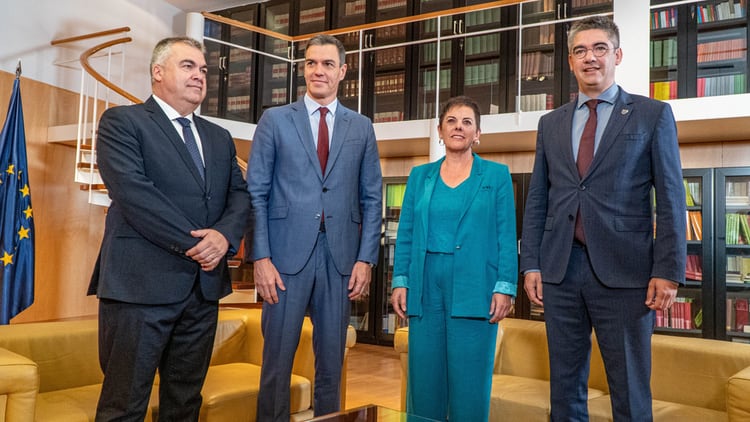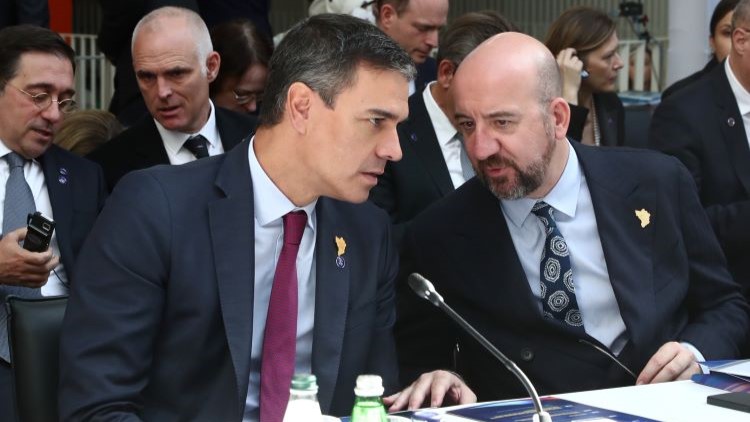Ángel Collado
As he makes progress in his commitments to the far left, including the whitewashing of the heirs of ETA’s political wing, the more demanding the Catalan pro-independence parties become. Pedro Sánchez has become bogged down in a race of concessions in which his partners are competing among themselves for the leading role in the delegitimisation of the constitutional regime. Having conceded amnesty for the coup perpetrators in exchange for their votes, the beneficiaries now want a concrete plan for a referendum on self-determination.
For almost three months now, the Socialist leader has taken it for granted that he will continue as prime minister, despite losing and coming second in the general elections, but his investiture has no date yet, nor has his support been confirmed in public other than the 121 seats of the PSOE itself plus the 6 of Bildu. They add up to 127 deputies in a House of 350 members.
The other parties called to ensure the continuity of Sanchismo in power, the national or regional left-wing parties plus the Basque Nationalist Party, are still waiting for the one who has the last word with their seven votes: Carles Puigdemont, the former president of the Generalitat who was mainly responsible for the secessionist attempt in Catalonia on 1 October 2017 and who is now a fugitive from justice.
Alberto Núñez Feijóo’s investiture attempt was rejected by Congress three weeks ago when the PP candidate was left with 172 votes in favour, without Sánchez having managed to turn the 178 “noes” into “yeses” for his aspirations since then. And from the first forecasts of calling another investiture plenary session for the third week of October, it has been left for November in generic terms.
The socialists accused the PP of “wasting time” for a month and now they are preparing to rush all the deadlines. If there is no president on 27 November, the Cortes will be dissolved and new elections will be called for 14 January.
For the moment, Sánchez’s main advances to be re-elected consist of applying himself to meeting the demands of his allies from the last legislature and of his potential partners in the one that has not yet begun.
The acting chief executive has culminated the operation to whitewash Bildu, an electoral brand that includes the heirs of ETA’s political wing, with a photo of the meeting with its parliamentary spokespersons in Congress and the Senate: Mertxe Aizpurúa, once convicted of glorifying terrorism, and Borja Elejabarrieta, a close friend of the gang’s gunman Alex Akarregi, implicated in the attack on former socialist leader Eduardo Madina.
Bildu celebrated as a milestone in its objectives the image achieved with the president of the government, whom it has been supporting for four years in exchange for prison favours for ETA members, and its leaders confirmed the renewal of its parliamentary support, starting with the investiture.
In relations with the Catalan separatists, Sánchez’s concessions have so far been unproductive for their interests. With the political and media machinery of Sanchismo already in place to make the amnesty law demanded by Puigdemont digestible in exchange for his endorsement, both the fugitive’s followers and those of Oriol Junqueras (head of ERC) are now competing to set deadlines and conditions for their next objective: a referendum on self-determination.
Catalan separatists have taken note of Sánchez’s firm determination to stay in power at any cost and are raising their bill every week. Promised judicial impunity, the fugitive ex-president of the Generalitat wants to go further and set out in writing the path to Catalonia’s secession.
Junqueras is not lagging behind in his demands either and refuses to give stability to the Socialist candidate once he is invested, if he succeeds, with agreements on fundamental laws such as the General State Budget. Sánchez’s optimism about the imminence of a new ‘progressive’ government contrasts more and more with the messages of the parties called upon to support it.







